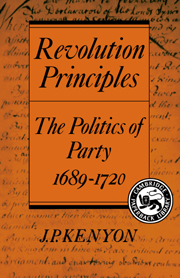Book contents
- Frontmatter
- Contents
- Preface
- Preface to the paperback edition (1990)
- 1 Introduction
- 2 By force or by miracle
- 3 The measure of submission
- 4 This skein of tangled principles
- 5 King Charles's head
- 6 The bloody flag
- 7 Revolution Principles
- 8 Black and odious colours
- 9 The four last years
- 10 That triumphant appellation
- 11 Conclusion
- Appendix
- Abbreviations
- Notes
- Addendum
- Index
7 - Revolution Principles
Whiggism under Queen Anne
Published online by Cambridge University Press: 07 October 2009
- Frontmatter
- Contents
- Preface
- Preface to the paperback edition (1990)
- 1 Introduction
- 2 By force or by miracle
- 3 The measure of submission
- 4 This skein of tangled principles
- 5 King Charles's head
- 6 The bloody flag
- 7 Revolution Principles
- 8 Black and odious colours
- 9 The four last years
- 10 That triumphant appellation
- 11 Conclusion
- Appendix
- Abbreviations
- Notes
- Addendum
- Index
Summary
The Tories certainly sustained a defeat in 1705, but it is difficult to assess its nature or its extent in political terms, and it did not imply a Whig victory. The concept of ‘alternative government’ had not yet emerged, and if it had Queen Anne was the last monarch to pay attention to it; she disliked party rancour of any kind, and she had a particular antipathy for the Junto leaders. Some contemporaries even thought that her attitude towards Whiggism in general was dictated by a belated guilt for her own share in the Revolution.
In Robert Harley she found a minister who echoed and reinforced many of her own ideas. Bred a Dissenter and raised as a Country Whig, Harley regarded the bigotry of the High Churchmen and the power-hunger of the Junto lords with equal aversion. To him political parties were an unwelcome and unnatural accretion on the constitution, antithetical to ‘the ancient liberties of England and the good of this poor nation’, and he envisaged the queen as playing a strong regal and managerial role in a multi-party or non-party administration devoted first to winning the war, then to making a just peace. His increasing influence on Anne, up to his fall in 1708, frustrated the ambitions of the party leaders and thus intensified the fury of the propaganda battle.
- Type
- Chapter
- Information
- Revolution PrinciplesThe Politics of Party 1689–1720, pp. 102 - 127Publisher: Cambridge University PressPrint publication year: 1977



